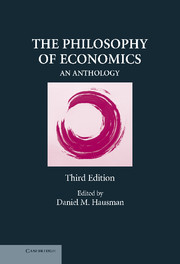Book contents
- Frontmatter
- Contents
- Introduction
- PART ONE CLASSIC DISCUSSIONS
- 1 On the Definition and Method of Political Economy
- 2 Objectivity and Understanding in Economics
- 3 The Nature and Significance of Economic Science
- 4 Economics and Human Action
- 5 Selected Texts on Economics, History, and Social Science
- 6 The Limitations of Marginal Utility
- PART TWO POSITIVIST AND POPPERIAN VIEWS
- PART THREE IDEOLOGY AND NORMATIVE ECONOMICS
- PART FOUR BRANCHES AND SCHOOLS OF ECONOMICS AND THEIR METHODOLOGICAL PROBLEMS
- PART FIVE NEW DIRECTIONS IN ECONOMIC METHODOLOGY
- Selected Bibliography of Books on Economic Methodology
- Index
5 - Selected Texts on Economics, History, and Social Science
Published online by Cambridge University Press: 05 June 2012
- Frontmatter
- Contents
- Introduction
- PART ONE CLASSIC DISCUSSIONS
- 1 On the Definition and Method of Political Economy
- 2 Objectivity and Understanding in Economics
- 3 The Nature and Significance of Economic Science
- 4 Economics and Human Action
- 5 Selected Texts on Economics, History, and Social Science
- 6 The Limitations of Marginal Utility
- PART TWO POSITIVIST AND POPPERIAN VIEWS
- PART THREE IDEOLOGY AND NORMATIVE ECONOMICS
- PART FOUR BRANCHES AND SCHOOLS OF ECONOMICS AND THEIR METHODOLOGICAL PROBLEMS
- PART FIVE NEW DIRECTIONS IN ECONOMIC METHODOLOGY
- Selected Bibliography of Books on Economic Methodology
- Index
Summary
Reprinted here are three texts. The first, “Estranged Labour” from Marx's Economic and Philosophical Manuscripts of 1844, provides a sweeping overview of his vision of the way in which the economic relations among people and the products of those relations dominate the very people who create and sustain those relations. The second, Marx's “Preface” to A Contribution to the Critique of Political Economy, very briefly sketches Marx's historical materialism, whereby the state of technology determines the economic relations among people, which in turn determine legal and political relations and the course of history. The third, “The Method of Political Economy,” which is a section of the “Introduction” to A Contribution to the Critique of Political Economy, contains Marx's most explicit and sustained discussion of economic methodology.
Estranged Labour
We have started out from the premises of political economy. We have accepted its language and its laws. We presupposed private property; the separation of labour, capital, and land, and likewise of wages, profit, and capital; the division of labour; competition; the conception of exchange value, etc. From political economy itself, using its own words, we have shown that the worker sinks to the level of a commodity, and moreover the most wretched commodity of all; that the misery of the worker is in inverse proportion to the power and volume of his production; that the necessary consequence of competition is the accumulation of capital in a few hands and hence the restoration of monopoly in a more terrible form; and that, finally, the distinction between capitalist and landlord, between agricultural worker and industrial worker, disappears and the whole of society must split into the two classes of property owners and propertyless workers.
- Type
- Chapter
- Information
- The Philosophy of EconomicsAn Anthology, pp. 108 - 128Publisher: Cambridge University PressPrint publication year: 2007



